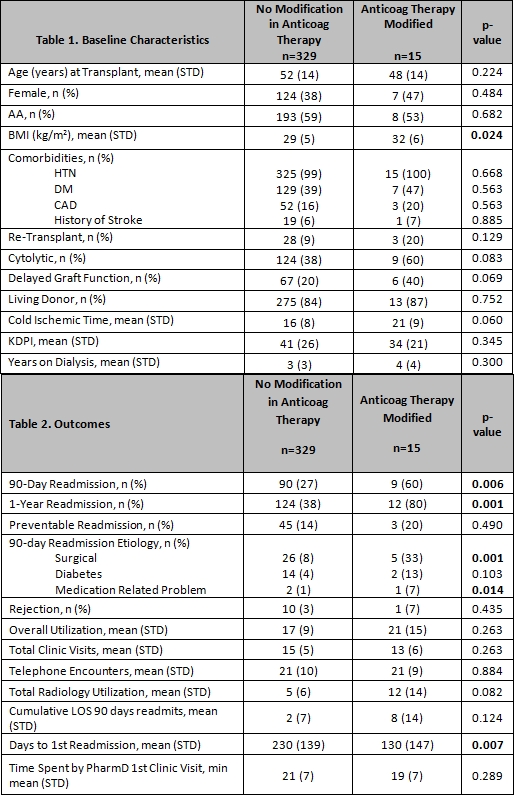The Impact of Anticoagulation Therapy Modifications during the Index Hospitalization on Clinical Outcomes in Kidney Transplant Recipients
J. Hardcopf, H. Meadows, N. Pilch, C. Perez, N. Patel, J. Fleming, H. Corbo, T. Harrison, B. O'Brien, D. DuBay, P. Baliga, D. Taber.
Medical University of South Carolina, Charleston, SC.
Meeting: 2018 American Transplant Congress
Abstract number: A215
Keywords: Anticoagulation, Kidney transplantation, Outcome
Session Information
Session Name: Poster Session A: Kidney: Cardiovascular and Metabolic
Session Type: Poster Session
Date: Saturday, June 2, 2018
Session Time: 5:30pm-7:30pm
 Presentation Time: 5:30pm-7:30pm
Presentation Time: 5:30pm-7:30pm
Location: Hall 4EF
Background: The aim of this study was to determine whether changing anticoagulation medications during the index admission for kidney transplant (KT) is significantly associated with post-transplant outcomes.
Methods: Retrospective cohort study of adult KT recipients between 7/2015 and 7/2017. All patients that had an admission medication reconciliation at time of transplant verified by a pharmacist and were seen in clinic within 3 days of discharge by a pharmacist were included in this study. Medication lists were compared pre and post-transplant to identify changes. Outcomes included readmissions, rejection, graft loss and healthcare utilization. Overall utilization was defined as a composite of clinic visits, length of stay of hospitalizations and ED visits 90 days post-transplant. Anticoag med modifications were defined as an addition and/or deletion of anticoagulants such as warfarin or LMWH.
Results: 344 patients were included. Baseline characteristics were similar between groups, except for BMI (Table 1). 90-day (60% vs 27%, p=0.006) and 1-year readmissions (80% vs 38%, p=0.001) were significantly higher in those with anticoagulation modifications during transplant admission. Readmission etiologies demonstrated that KTs with anticoag modifications were readmitted predominately for surgical complications and medication related problems; time to readmission was significantly shorter in anticoag modifications patients as well (Table 2). Multivariable modeling demonstrated readmission risks associated with anticoag modifications remained significant after adjusted for baseline demographics (age, BMI, and KDPI). Overall utilization was not found to differ significantly in the 90 days post-transplant period (Table 2).
Conclusion: KTs undergoing modification of anticoagulation during the index hospitalization are at substantially higher risk for readmission. Focusing efforts to improve monitoring and management of these patients may mitigate risk.
CITATION INFORMATION: Hardcopf J., Meadows H., Pilch N., Perez C., Patel N., Fleming J., Corbo H., Harrison T., O'Brien B., DuBay D., Baliga P., Taber D. The Impact of Anticoagulation Therapy Modifications during the Index Hospitalization on Clinical Outcomes in Kidney Transplant Recipients Am J Transplant. 2017;17 (suppl 3).
To cite this abstract in AMA style:
Hardcopf J, Meadows H, Pilch N, Perez C, Patel N, Fleming J, Corbo H, Harrison T, O'Brien B, DuBay D, Baliga P, Taber D. The Impact of Anticoagulation Therapy Modifications during the Index Hospitalization on Clinical Outcomes in Kidney Transplant Recipients [abstract]. https://atcmeetingabstracts.com/abstract/the-impact-of-anticoagulation-therapy-modifications-during-the-index-hospitalization-on-clinical-outcomes-in-kidney-transplant-recipients/. Accessed February 17, 2026.« Back to 2018 American Transplant Congress

